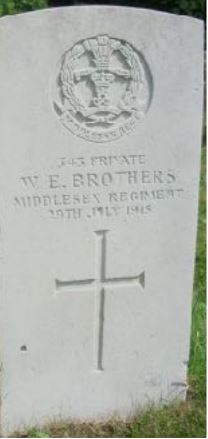4th Battalion, Middlesex Regiment

William Ernest Brothers was born on 19 September 1879 at Camden Town, north London. His parents were Major (name not rank) John Brothers (1884-1919) and his wife Eliza Matilda (née Stocks: 1841-1913). According to the 1911 Census the couple had eight children of whom five had survived by that time.
Private Brothers is unusual in that his Army Service Record is one of those which survived destruction by enemy action in 1940 and he has an entry in De Ruvigny’s Roll of Honour. The Marquis de Ruvigny set out to produce a work which listed all those who fell in the Great War, along (in some instances) with photos and biographical information supplied by the family. He produced five volumes, covering about 25,000 names, before the scale of the casualties rendered it ‘mission impossible’.
Using the information available from these sources, plus reports of his death in the Gloucestershire Echo of 30 and 31 July 1915, it is possible to collate a detailed picture of William’s military career.
At the time of the 1911 Census William was living at 71 Pratt Street, Camden Town with his father (his mother would appear to have been absent from the property on the day the census was taken). It was noted that William was a single man and his occupation was a cooper (or barrel maker and repairer), as was his father.
According to his Attestation papers, signed at Islington, on 26 August 1914 William joined the Army Reserve (Special Reserve) for (an initial) one year’s service with the Middlesex Regiment. He stated his occupation to be a cooper and his age as 34 years and 344 days. He had previous military service (stated to be six years and five months) with the Middlesex Regiment and had served in the South African (Boer) War from 1900 to 1902 and was awarded a Queens Medal with clasps. He had left the Army when his term of service had expired. As an experienced soldier he was either recalled or volunteered for service very early in the war.
His initial posting was to the 6th (Reserve) Battalion of the Middlesex Regiment, which was a training unit based in the Medway area of Kent. On 11 November 1914 he was posted to the Western Front to join the 4th Middlesex, part of 8 Brigade, 3 Division. All his time on the Western Front was spent in the Ypres Salient or the rest areas on its periphery.
On 19 July 1915 the 4th Middlesex were in trenches at Hooge, just off the Menin Road. According to the Battalion’s War Diary, their trenches were subjected to shell fire at about 6am and one man was killed and two wounded: it is possible that Private Brothers was one of those two. That evening, at about 7pm, the British blew a mine, containing 35,000 pounds of ammonal, under a German strong hold and it is believed that between 200 to 600 Germans died as a result. The 4th Middlesex waiting to attack was showered with the debris and sustained about 300 casualties, so he might have been of these.
William had suffered a gunshot wound (which could mean either shrapnel or debris) to his left buttock and was passed down the casualty treatment line to one of the Stationery Hospitals at Rouen and then transferred to England on 25 July, arriving at Southampton. He was sent to St John’s Voluntary Aid Hospital, Gloucester Road, Cheltenham (established in a former school about a month previously), where he was admitted on the 26th. His wound did not appear overly serious or life threatening but tetanus had set in and despite efforts to save him he died at about 3.45am on 29 July 1915, aged 37. His service in the Great War had lasted 338 days
He was buried, with military honours, in Cheltenham Cemetery, the funeral being reported in the Gloucestershire Echo of 31 July. His family mourners were his father, a brother and two sisters. His grave is now marked by a standard CWGC headstone.
William’s brother, G/5614 Private Charles Alfred Major Brothers (born 1870), also served with the Middlesex Regiment (3rd Battalion). He had arrived on the Western Front in early 1915 and was also in the trenches in the Ypres Salient. The Battalion’s War Diary records that 262 casualties amongst Other Ranks had been sustained from the 12th to the end of February. It is possible that Private Charles Brothers was one of these, as he died of wounds in No 1 Southern General Hospital, Birmingham on 20 March 1915. He is buried in Highgate Cemetery, north London.
Researched by Graham Adams 3 May 2020
